Unit 10 I've had this bike for three years.单元知识点课件(共30张PPT)
文档属性
| 名称 | Unit 10 I've had this bike for three years.单元知识点课件(共30张PPT) | 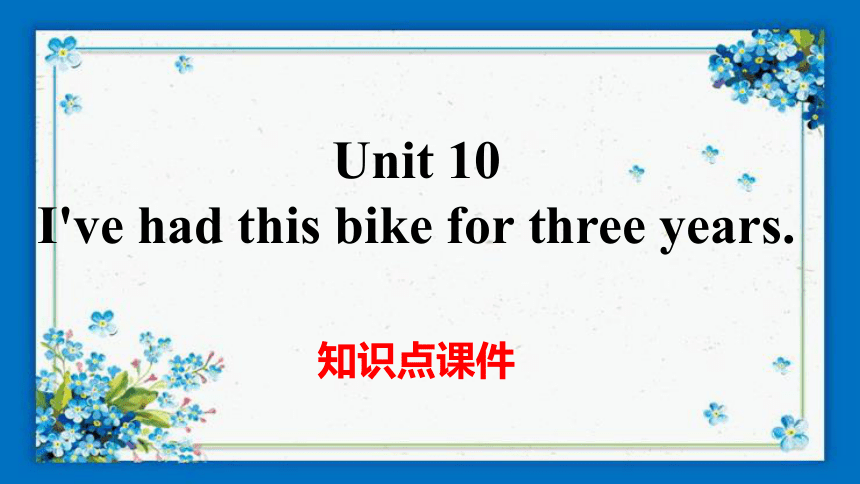 | |
| 格式 | pptx | ||
| 文件大小 | 182.3KB | ||
| 资源类型 | 教案 | ||
| 版本资源 | 人教新目标(Go for it)版 | ||
| 科目 | 英语 | ||
| 更新时间 | 2023-06-20 16:43:55 | ||
图片预览

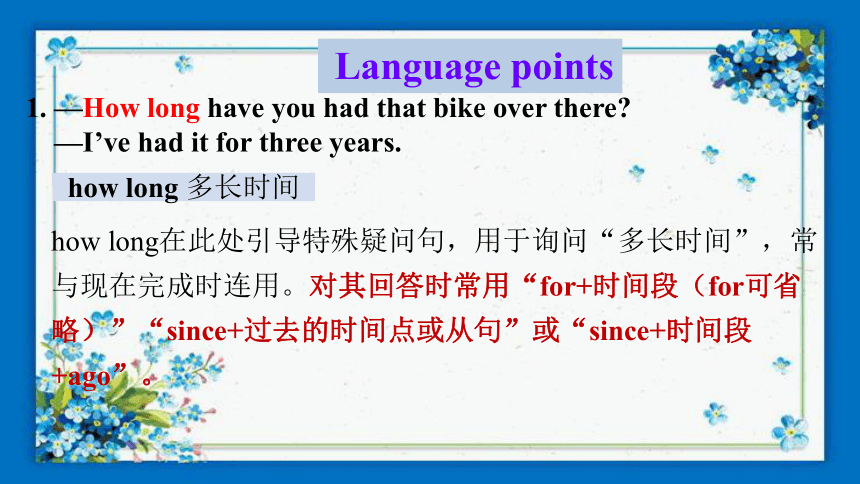
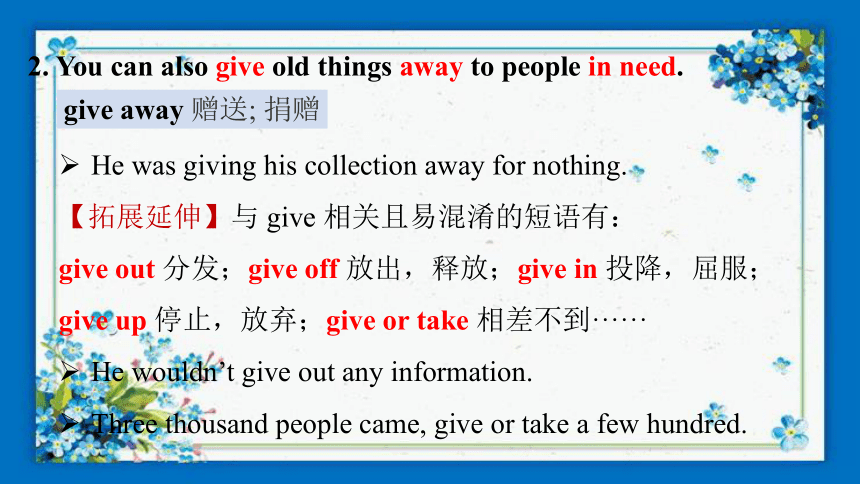
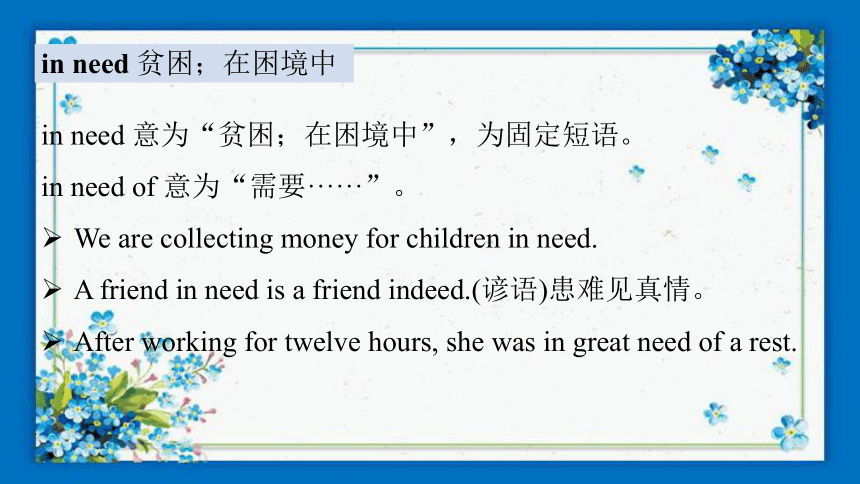
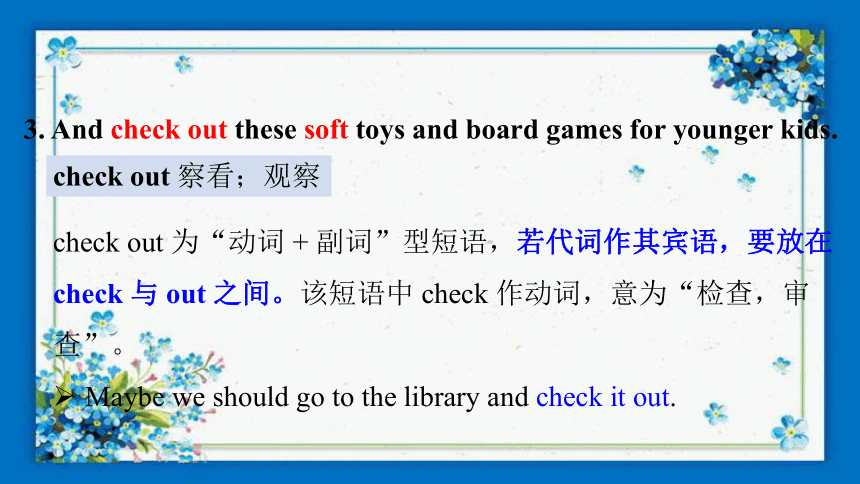
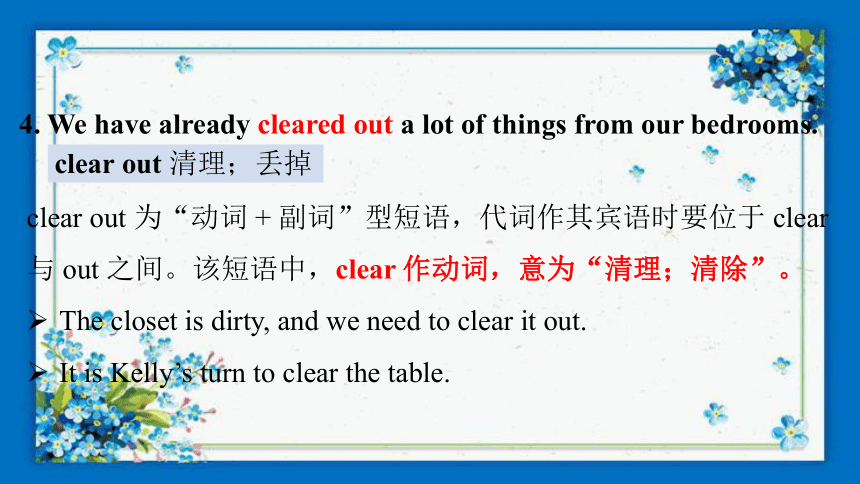
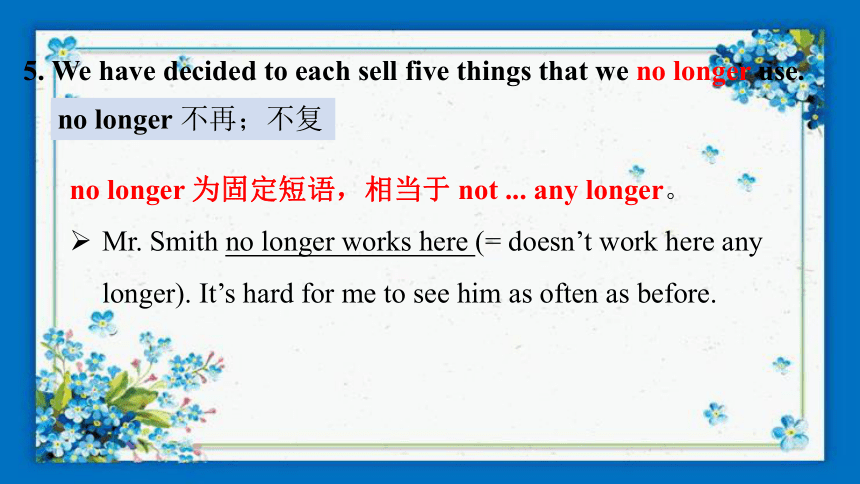
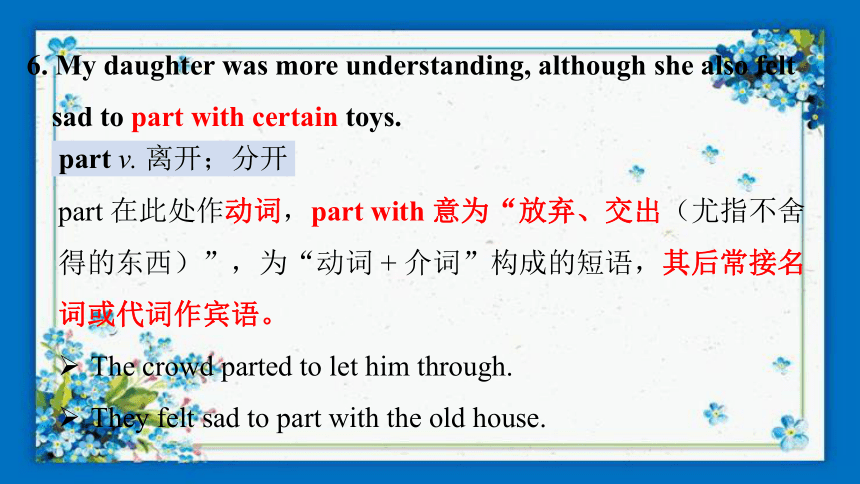
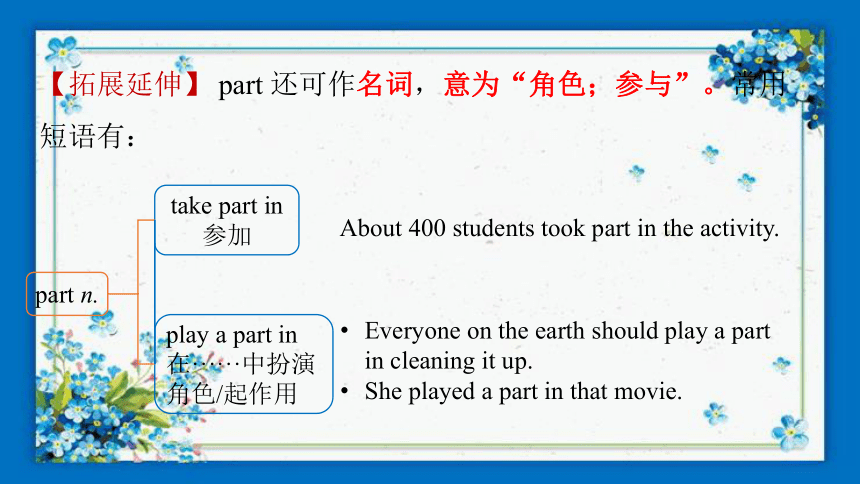
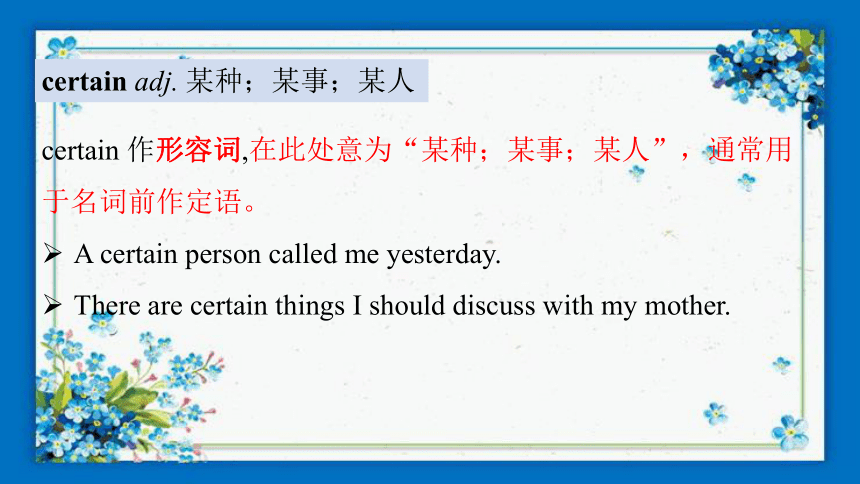
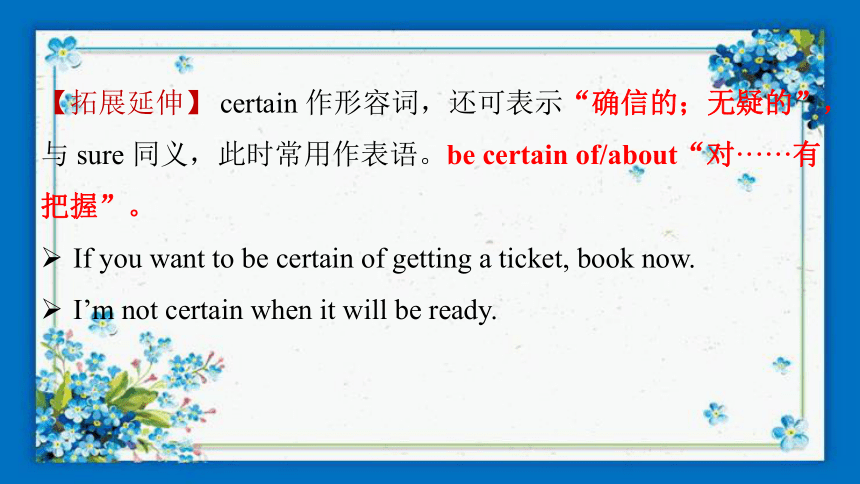
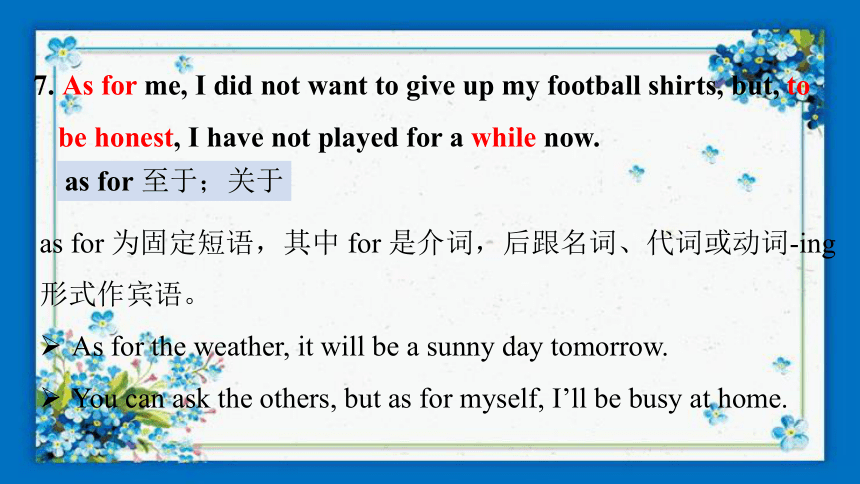
文档简介
(共30张PPT)
知识点课件
Unit 10
I've had this bike for three years.
Language points
1. —How long have you had that bike over there
—I’ve had it for three years.
how long 多长时间
how long在此处引导特殊疑问句,用于询问“多长时间”,常与现在完成时连用。对其回答时常用“for+时间段(for可省略)”“since+过去的时间点或从句”或“since+时间段+ago”。
2. You can also give old things away to people in need.
give away 赠送; 捐赠
He was giving his collection away for nothing.
【拓展延伸】与 give 相关且易混淆的短语有:
give out 分发;give off 放出,释放;give in 投降,屈服;give up 停止,放弃;give or take 相差不到······
He wouldn’t give out any information.
Three thousand people came, give or take a few hundred.
in need 贫困;在困境中
in need 意为“贫困;在困境中”,为固定短语。
in need of 意为“需要······”。
We are collecting money for children in need.
A friend in need is a friend indeed.(谚语)患难见真情。
After working for twelve hours, she was in great need of a rest.
3. And check out these soft toys and board games for younger kids.
check out 察看;观察
check out 为“动词 + 副词”型短语,若代词作其宾语,要放在 check 与 out 之间。该短语中 check 作动词,意为“检查,审查”。
Maybe we should go to the library and check it out.
clear out 清理;丢掉
4. We have already cleared out a lot of things from our bedrooms.
clear out 为“动词 + 副词”型短语,代词作其宾语时要位于 clear 与 out 之间。该短语中,clear 作动词,意为“清理;清除”。
The closet is dirty, and we need to clear it out.
It is Kelly’s turn to clear the table.
no longer 不再;不复
5. We have decided to each sell five things that we no longer use.
no longer 为固定短语,相当于 not ... any longer。
Mr. Smith no longer works here (= doesn’t work here any longer). It’s hard for me to see him as often as before.
part v. 离开;分开
6. My daughter was more understanding, although she also felt sad to part with certain toys.
part 在此处作动词,part with 意为“放弃、交出(尤指不舍得的东西)”,为“动词 + 介词”构成的短语,其后常接名词或代词作宾语。
The crowd parted to let him through.
They felt sad to part with the old house.
【拓展延伸】 part 还可作名词,意为“角色;参与”。常用短语有:
part n.
take part in
参加
play a part in 在······中扮演角色/起作用
About 400 students took part in the activity.
Everyone on the earth should play a part in cleaning it up.
She played a part in that movie.
certain adj. 某种;某事;某人
certain 作形容词,在此处意为“某种;某事;某人”,通常用于名词前作定语。
A certain person called me yesterday.
There are certain things I should discuss with my mother.
【拓展延伸】 certain 作形容词,还可表示“确信的;无疑的”,与 sure 同义,此时常用作表语。be certain of/about“对······有把握”。
If you want to be certain of getting a ticket, book now.
I’m not certain when it will be ready.
as for 至于;关于
7. As for me, I did not want to give up my football shirts, but, to be honest, I have not played for a while now.
as for 为固定短语,其中 for 是介词,后跟名词、代词或动词-ing 形式作宾语。
As for the weather, it will be a sunny day tomorrow.
You can ask the others, but as for myself, I’ll be busy at home.
to be honest 说实在的
to be honest 通常作插入语,其后常用逗号与句子的其他部分隔开。与 to be honest 意思相近的短语是 to tell (you) the truth“老实说;说实话”。honest 作形容词,意为“诚实的;老实的”。
To be honest, he is an honest and hard-working boy.
while n. 一段时间;一会儿
while 在此处用作名词,意为“一段时间;一会儿”,常用单数形式,与不定冠词 a 连用。常用搭配有:
after a while 过了一会儿 for a while 暂时;一会儿
quite a while 很长一段时间 in a while 不久;马上
all the while 一直;始终 once in a while 偶尔;有时
8.Even though it’s old, it’s full of interesting places to see and things to do.
1) even though和even if两者均可用于引导让步状语从句,其细微区别是:even if引导的从句往往是假设性的,相当于汉语的“即使”“纵然”“就算”“哪怕”。even though引导的从句内容往往是真实的,主要用于引出不利于主句情况的信息,相当于汉语的“尽管”“虽然”。 不过,在实际语言运用中,even if与even though有时也可不加区别地混用。
虽然我们已尽了最大的努力,但还是输了。
Although/Though/Even though we all tried our best, we lost the game.
我们输了,虽然我们已尽了最大的努力。
We lost the game although/though/even though we tried our best.
2) although和(even) though均可用于句首或从句之首。though多用于非正式文体中,较为通俗。
3) be full of = be filled with 充满,装满
瓶子里装满了水。
The bottle is filled with water.
满屋浓烟。
The room is filled with heavy smoke.
香槟酒有很多气泡。
Champagne (香槟酒) is full of bubbles (气泡).
search v. & n. 搜索;搜查
9. Nowadays, millions of Chinese leave the countryside to search for work in the cities.
① search在此处作动词,意为“搜索;搜查”。
search ( + 地点) for sb./ sth. (在某处)搜寻某人/某物
search sb. 搜某人的身
He searched for his schoolbag everywhere.
Visitors are regularly searched as they enter the building.
② search 意为“搜索;搜查”时还可作名词。
in search of 意为“寻找……”。
They made a long search for the missing child.
Tom went to the big city in search of a good job.
among prep. 在(其)中;……之一
10. Among these is Zhong Wei, a 46-year-old husband and father.
among 作介词,用于三者或三者以上的情况,其常见用法如下:
① 用来引出最高级的比较范围。
The movie is the best among the modern movies.
② 表示“……之一”,相当于“one of …”。
New York is among( = one of ) the largest cities in the world.
【易混辨析】among 与 between
among 用于三者或三者以上 Among all the school subjects,English is my favorite.
在所有的学科中,英语是我特别喜爱的。
between 指两者之间 The paper fell down between the desk and the wall.
那张纸掉在桌子和墙壁之间(的缝隙里)了。
regard v. (尤指以某种方式)注视,凝视;
11. Many people like Zhong Wei regard with great interest how their hometowns have changed.
(1) regard 在此处作动词,意为“(尤指以某种方式)注视,凝视”。She stood back and regarded him coldly.
(2) regard作动词时,还可意为“将……认为;把……视为;看待”。regard…as…表示“把……当作/视为……”。
His work is highly regarded by artists.
We always regard red as the symbol of hope and good luck.
v. 将……认为;把……视为;看待
according to 依据;按照
12. According to Zhong Wei, however, some things will never change.
according to 在此处意为“据……所说”。
According to Professor Li, robots play an important role in people’s daily life.
According to the timetable, the train leaves at 8:27.
13. consider v. 注视;仔细考虑
① consider 作及物动词,意为“注视”。
He considered the man for some time before speaking to him.
② consider 作动词,还可意为“仔细考虑”,与 think about 同义。consider doing sth.“考虑做某事”。
The government continues to consider ways to solve the problem.
You have to consider what to do next.
I seriously considered having a short trip after this important exam.
close to 几乎;接近
14. Zhong Wei hasn’t been back in close to three years.
He was close to tears. 他几乎要掉眼泪了。
It’s close to six o’clock. Let’s go. (= almost)
My house is close to the new supermarket. (= near)
Exercises
一、单项选择。
1. Both his parents look sad. Maybe they ________ what happened to him.
A. knew B. have known C. must know D. will know
2. He has _____ been to Shanghai , has he
A. already B. never C. ever D. still
3. It _____ ten years since he left the army.
A. is B. has C. will D. was
B
B
A
4. The famous writer _____ one new book in the past two years.
A. is writing B. was writing C. wrote D. has written
5. —Our country ______ a lot so far.
—Yes. I hope it will be even ______.
A. has changed ; well B. changed ; good
C. has changed ; better D. changed ; better
D
C
6. Zhao Lan ______ already ______ in this school for two years.
A. was ; studying B. will ; study
C. has ; studied D. are ; studying
7. We ______ Xiao Li since she was a little girl.
A. know B. had known
C. have known D. knew
C
C
8. Harry Potter is a very nice film .I _______ it twice.
A. will see B. have seen C. saw D. see
9. —These farmers have been to the United States.
—Really When _____ there
A. will they go B. did they go C. do they go D. have they gone
10. — ______ you _____ your homework yet
—Yes. I _____ it a moment ago .
A. Did; do; finished B. Have; done; finished
C. Have; done; have finished D. Will; do; finish
B
B
B
二、句型转换。
1.He waters the plants often. (用already改写句子)
He ________ ________ ________ the plants.
2.Mr. Li began to teach English in this school in 1999. (改为同义句)
Mr. Li ________ ________ English in this school since 1999.
3.I have been to Australia. (用never改为否定句)
I ________ ________ ________ ________ Australia.
4.They have been here since 2000. (对画线部分提问)
________ ________ have they been here
has already watered
has taught
have never been to
How long
知识点课件
Unit 10
I've had this bike for three years.
Language points
1. —How long have you had that bike over there
—I’ve had it for three years.
how long 多长时间
how long在此处引导特殊疑问句,用于询问“多长时间”,常与现在完成时连用。对其回答时常用“for+时间段(for可省略)”“since+过去的时间点或从句”或“since+时间段+ago”。
2. You can also give old things away to people in need.
give away 赠送; 捐赠
He was giving his collection away for nothing.
【拓展延伸】与 give 相关且易混淆的短语有:
give out 分发;give off 放出,释放;give in 投降,屈服;give up 停止,放弃;give or take 相差不到······
He wouldn’t give out any information.
Three thousand people came, give or take a few hundred.
in need 贫困;在困境中
in need 意为“贫困;在困境中”,为固定短语。
in need of 意为“需要······”。
We are collecting money for children in need.
A friend in need is a friend indeed.(谚语)患难见真情。
After working for twelve hours, she was in great need of a rest.
3. And check out these soft toys and board games for younger kids.
check out 察看;观察
check out 为“动词 + 副词”型短语,若代词作其宾语,要放在 check 与 out 之间。该短语中 check 作动词,意为“检查,审查”。
Maybe we should go to the library and check it out.
clear out 清理;丢掉
4. We have already cleared out a lot of things from our bedrooms.
clear out 为“动词 + 副词”型短语,代词作其宾语时要位于 clear 与 out 之间。该短语中,clear 作动词,意为“清理;清除”。
The closet is dirty, and we need to clear it out.
It is Kelly’s turn to clear the table.
no longer 不再;不复
5. We have decided to each sell five things that we no longer use.
no longer 为固定短语,相当于 not ... any longer。
Mr. Smith no longer works here (= doesn’t work here any longer). It’s hard for me to see him as often as before.
part v. 离开;分开
6. My daughter was more understanding, although she also felt sad to part with certain toys.
part 在此处作动词,part with 意为“放弃、交出(尤指不舍得的东西)”,为“动词 + 介词”构成的短语,其后常接名词或代词作宾语。
The crowd parted to let him through.
They felt sad to part with the old house.
【拓展延伸】 part 还可作名词,意为“角色;参与”。常用短语有:
part n.
take part in
参加
play a part in 在······中扮演角色/起作用
About 400 students took part in the activity.
Everyone on the earth should play a part in cleaning it up.
She played a part in that movie.
certain adj. 某种;某事;某人
certain 作形容词,在此处意为“某种;某事;某人”,通常用于名词前作定语。
A certain person called me yesterday.
There are certain things I should discuss with my mother.
【拓展延伸】 certain 作形容词,还可表示“确信的;无疑的”,与 sure 同义,此时常用作表语。be certain of/about“对······有把握”。
If you want to be certain of getting a ticket, book now.
I’m not certain when it will be ready.
as for 至于;关于
7. As for me, I did not want to give up my football shirts, but, to be honest, I have not played for a while now.
as for 为固定短语,其中 for 是介词,后跟名词、代词或动词-ing 形式作宾语。
As for the weather, it will be a sunny day tomorrow.
You can ask the others, but as for myself, I’ll be busy at home.
to be honest 说实在的
to be honest 通常作插入语,其后常用逗号与句子的其他部分隔开。与 to be honest 意思相近的短语是 to tell (you) the truth“老实说;说实话”。honest 作形容词,意为“诚实的;老实的”。
To be honest, he is an honest and hard-working boy.
while n. 一段时间;一会儿
while 在此处用作名词,意为“一段时间;一会儿”,常用单数形式,与不定冠词 a 连用。常用搭配有:
after a while 过了一会儿 for a while 暂时;一会儿
quite a while 很长一段时间 in a while 不久;马上
all the while 一直;始终 once in a while 偶尔;有时
8.Even though it’s old, it’s full of interesting places to see and things to do.
1) even though和even if两者均可用于引导让步状语从句,其细微区别是:even if引导的从句往往是假设性的,相当于汉语的“即使”“纵然”“就算”“哪怕”。even though引导的从句内容往往是真实的,主要用于引出不利于主句情况的信息,相当于汉语的“尽管”“虽然”。 不过,在实际语言运用中,even if与even though有时也可不加区别地混用。
虽然我们已尽了最大的努力,但还是输了。
Although/Though/Even though we all tried our best, we lost the game.
我们输了,虽然我们已尽了最大的努力。
We lost the game although/though/even though we tried our best.
2) although和(even) though均可用于句首或从句之首。though多用于非正式文体中,较为通俗。
3) be full of = be filled with 充满,装满
瓶子里装满了水。
The bottle is filled with water.
满屋浓烟。
The room is filled with heavy smoke.
香槟酒有很多气泡。
Champagne (香槟酒) is full of bubbles (气泡).
search v. & n. 搜索;搜查
9. Nowadays, millions of Chinese leave the countryside to search for work in the cities.
① search在此处作动词,意为“搜索;搜查”。
search ( + 地点) for sb./ sth. (在某处)搜寻某人/某物
search sb. 搜某人的身
He searched for his schoolbag everywhere.
Visitors are regularly searched as they enter the building.
② search 意为“搜索;搜查”时还可作名词。
in search of 意为“寻找……”。
They made a long search for the missing child.
Tom went to the big city in search of a good job.
among prep. 在(其)中;……之一
10. Among these is Zhong Wei, a 46-year-old husband and father.
among 作介词,用于三者或三者以上的情况,其常见用法如下:
① 用来引出最高级的比较范围。
The movie is the best among the modern movies.
② 表示“……之一”,相当于“one of …”。
New York is among( = one of ) the largest cities in the world.
【易混辨析】among 与 between
among 用于三者或三者以上 Among all the school subjects,English is my favorite.
在所有的学科中,英语是我特别喜爱的。
between 指两者之间 The paper fell down between the desk and the wall.
那张纸掉在桌子和墙壁之间(的缝隙里)了。
regard v. (尤指以某种方式)注视,凝视;
11. Many people like Zhong Wei regard with great interest how their hometowns have changed.
(1) regard 在此处作动词,意为“(尤指以某种方式)注视,凝视”。She stood back and regarded him coldly.
(2) regard作动词时,还可意为“将……认为;把……视为;看待”。regard…as…表示“把……当作/视为……”。
His work is highly regarded by artists.
We always regard red as the symbol of hope and good luck.
v. 将……认为;把……视为;看待
according to 依据;按照
12. According to Zhong Wei, however, some things will never change.
according to 在此处意为“据……所说”。
According to Professor Li, robots play an important role in people’s daily life.
According to the timetable, the train leaves at 8:27.
13. consider v. 注视;仔细考虑
① consider 作及物动词,意为“注视”。
He considered the man for some time before speaking to him.
② consider 作动词,还可意为“仔细考虑”,与 think about 同义。consider doing sth.“考虑做某事”。
The government continues to consider ways to solve the problem.
You have to consider what to do next.
I seriously considered having a short trip after this important exam.
close to 几乎;接近
14. Zhong Wei hasn’t been back in close to three years.
He was close to tears. 他几乎要掉眼泪了。
It’s close to six o’clock. Let’s go. (= almost)
My house is close to the new supermarket. (= near)
Exercises
一、单项选择。
1. Both his parents look sad. Maybe they ________ what happened to him.
A. knew B. have known C. must know D. will know
2. He has _____ been to Shanghai , has he
A. already B. never C. ever D. still
3. It _____ ten years since he left the army.
A. is B. has C. will D. was
B
B
A
4. The famous writer _____ one new book in the past two years.
A. is writing B. was writing C. wrote D. has written
5. —Our country ______ a lot so far.
—Yes. I hope it will be even ______.
A. has changed ; well B. changed ; good
C. has changed ; better D. changed ; better
D
C
6. Zhao Lan ______ already ______ in this school for two years.
A. was ; studying B. will ; study
C. has ; studied D. are ; studying
7. We ______ Xiao Li since she was a little girl.
A. know B. had known
C. have known D. knew
C
C
8. Harry Potter is a very nice film .I _______ it twice.
A. will see B. have seen C. saw D. see
9. —These farmers have been to the United States.
—Really When _____ there
A. will they go B. did they go C. do they go D. have they gone
10. — ______ you _____ your homework yet
—Yes. I _____ it a moment ago .
A. Did; do; finished B. Have; done; finished
C. Have; done; have finished D. Will; do; finish
B
B
B
二、句型转换。
1.He waters the plants often. (用already改写句子)
He ________ ________ ________ the plants.
2.Mr. Li began to teach English in this school in 1999. (改为同义句)
Mr. Li ________ ________ English in this school since 1999.
3.I have been to Australia. (用never改为否定句)
I ________ ________ ________ ________ Australia.
4.They have been here since 2000. (对画线部分提问)
________ ________ have they been here
has already watered
has taught
have never been to
How long
同课章节目录
- Unit 1 What's the matter?
- Section A
- Section B
- Unit 2 I'll help to clean up the city parks.
- Section A
- Section B
- Unit 3 Could you please clean your room?
- Section A
- Section B
- Unit 4 Why don't you talk to your parents?
- Section A
- Section B
- Unit 5 What were you doing when the rainstorm came
- Section A
- Section B
- Review of Units 1-5
- Unit 6 An old man tried to move the mountains.
- Section A
- Section B
- Unit 7 What's the highest mountain in the world?
- Section A
- Section B
- Unit 8 Have you read Treasure Island yet?
- Section A
- Section B
- Unit 9 Have you ever been to a museum?
- Section A
- Section B
- Unit 10 I've had this bike for three years.
- Section A
- Section B
